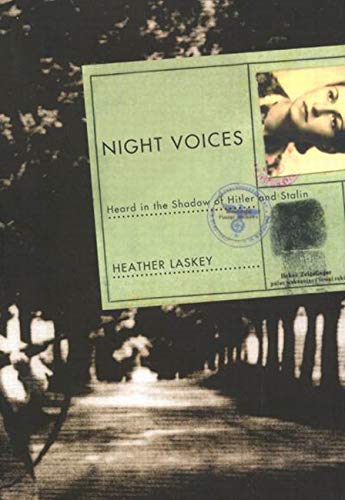

Most ebook files are in PDF format, so you can easily read them using various software such as Foxit Reader or directly on the Google Chrome browser.
Some ebook files are released by publishers in other formats such as .awz, .mobi, .epub, .fb2, etc. You may need to install specific software to read these formats on mobile/PC, such as Calibre.
Please read the tutorial at this link. https://ebooknice.com/page/post?id=faq
We offer FREE conversion to the popular formats you request; however, this may take some time. Therefore, right after payment, please email us, and we will try to provide the service as quickly as possible.
For some exceptional file formats or broken links (if any), please refrain from opening any disputes. Instead, email us first, and we will try to assist within a maximum of 6 hours.
EbookNice Team

Status:
Available4.4
39 reviews
ISBN-10 : 0773571426
ISBN-13 : 9780773571426
Author: Heather Laskey
It is the story of Poland in the years leading up to the war, the horrors Polish Jews faced during the Nazi occupation, the brief period of hope when they believed they were building a better society, and their gradual disillusionment as state sponsored corruption, brutality, Stalinist paranoia, and anti-Semitism developed. The story is told through the memories of four people, Stasia Alapin Rubilowicz, her husband Mietek Rubilowicz, her son Peter Alapin, and her friend Alina. Life in Poland before and during the war is seen primarily through Stasia's eyes, who evokes her youth in an affluent family, largely assimilated into Polish society. This life was shattered forever in her early adulthood when the Nazis invaded, bringing death and destruction to Poland and to Polish Jews in particular. She recounts the anguish of life in the Warsaw Ghetto, her escape from it, her survival on the run, her betrayal to the Gestapo by a woman who had known her at school, and her rescue from prison by Christian Polish friends at the risk of their lives. In the second half of the book we are introduced to Mietek and her friend Alina, who describe their experiences in Poland during and after the war and their hopes that communism would rid the country of bigotry injustice, and want. But as old hatreds, now supported by a perverted catechism of socialist dogma, reawakened anti-Semitism they became increasingly disillusioned, ultimately deciding they had no recourse but to leave Poland and start a new life elsewhere. By 1968 the Polish communist leadership, through a campaign of intimidation and harassment, had succeeded in ridding Poland of virtually all its surviving Jews.Night Voices is a testimony both to the strength of the human spirit and to our capacity for self-delusion
One Stasia’s First Life
(pp. 11-112)
https://www.jstor.org/stable/j.ctt7zx5c.6
In which Stasia tells the story of her “first life,” which she wished to be prefaced by these two quotations:
In our sort of life, everybody gladly falls for illusions or seeks some belief that gives a sense of reality. If the life around you is illusory, you take refuge in illusory activity, entering illusory relations with others, embarking on illusory love affairs – you must have something to hang on to.
Nadezhda Mandelstam,Hope against Hope
The natural inheritance of everyone who is capable of spiritual life is an unsubdued forest where the wolf howls and the obscene bird...
Two Mietek, Peter, and Alina Tell Their Stories(pp. 113-200)
Two Mietek, Peter, and Alina Tell Their Stories
(pp. 113-200)
https://www.jstor.org/stable/j.ctt7zx5c.7
In which the memories of three people whose lives intertwined with Stasia’s – her second husband, Mietek, her son, Peter, and her friend Alina – provide a story that is not only personal but one of place and of an era, of war and genocide, of a communist state that took shape behind the Iron Curtain, of how people were drawn into supporting it and how it betrayed and disillusioned them.
The figure of Jacek Rożański is also threaded through the narrative. His name first surfaced in talks with Peter, who knew Rożański, as did both Stasia and Alina. Mietek...
Three Stasia’s Second Life(pp. 201-238)
Three Stasia’s Second Life
(pp. 201-238)
https://www.jstor.org/stable/j.ctt7zx5c.8
In which Stasia tells the story of her second or “no” life.
Many of my contemporaries who accepted the Revolution went through a severe psychological crisis. They were trapped between a reality which could only be condemned and the need for a principle by which to justify it … many of them had awaited the Revolution all their lives, but at the sight of what it meant in terms of everyday life, they were horrified and looked away.
Nadezhda Mandelstam,Hope against Hope
How strange to say that although I have continued to exist all these years since the war...
Postscript(pp. 239-252)
Postscript
(pp. 239-252)
https://www.jstor.org/stable/j.ctt7zx5c.9
Stasia and Mietek would often say, “Nobody can know what it was like unless they were there at the time.” That is obviously true, and it is the reason that this story of interwoven odysseys has been told through the voices of those who were indeed there at that time. I would add that I am thankful I can only imagine, but cannot know, what it was like.
During a ten-day visit to Poland in 1992, I tried to get at least some small sense of the place and the people among whom these lives had unfolded. The opportunity arose...
i hear voices at night in my head
hearing voices in the middle of the night
voices of the night henry wadsworth longfellow
adolf hitler voices
voices in the night book
Tags: Night Voices, Heard, the Shadow, Hitler, Stalin, Heather Laskey